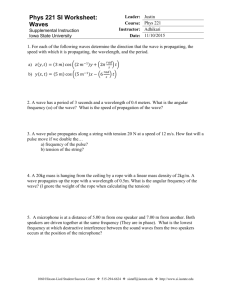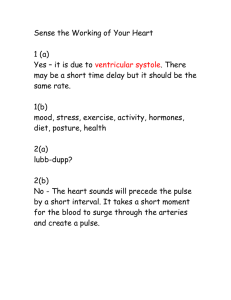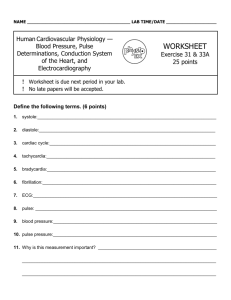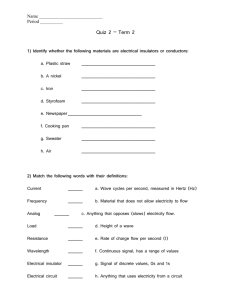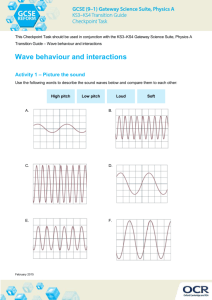Ramohalli_Nikitha_Pulse_Box_Engineering
advertisement
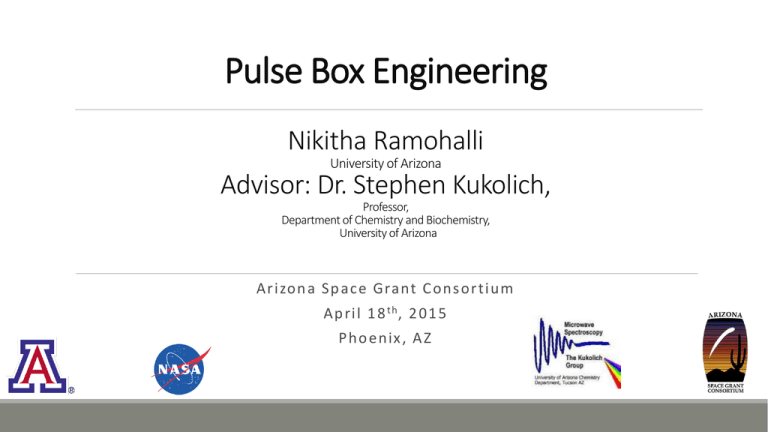
Pulse Box Engineering Nikitha Ramohalli University of Arizona Advisor: Dr. Stephen Kukolich, Professor, Department of Chemistry and Biochemistry, University of Arizona A rizo n a S p a c e Gra nt C o n so rt iu m A p ril 1 8 th , 2 0 1 5 Ph o e n ix, A Z Aknowledgements •NASA Space Grant Director: Susan Brew •NASA Space Grant Consortium •National Science Foundation •Research Group, including • • • • Aaron Pejlovas Kexin Li Onur Oncer Steven Edwards Background of Microwave Spectroscropy •Use Flygare-Balle type pulsed beam, Fourier Transform microwave Spectrometer •Use the results of this to determine the accurate 3-D molecular structures and electronic charge distributions of transition metal complexes, hydrogenbonded complexes and small molecules (Kukolich Research Group Webpage, chem.arizona.edu/kukolich/) •Frequencies of waves are on order of Giga-Hertz (4GHz-16GHz) Microwave Cavity Ne supply Computer for data collection Diff. pump Frequency Synthesizer Fore pump Source: Kukolich Research Group Seminar Presentation Aaron Pejlovas Background of Pulse Box •The Pulse Box controls the timing of the valves, microwaves and gas channels Controlled by Pulse Box Source: Kukolich Research Group Webpage, cbc.arizona.edu/kukolich/Microwave.htm Pulse Box Components •Timer (555): An integrated circuit that generates a square wave in which both the length of the square wave and the separation between the square waves can be externally set by resistors and capacitors Source: TI Instruments LS555 Data Sheet •One-Shot (74-123): An integrated circuit that uses an external trigger to generate a square wave. The period (in seconds) of this square wave is determined by a the product of the connected resistor and capacitor Source: TI Instruments 74LS123 Data Sheet The Problem •Currently the pulse box circuit is too close to the circuit that drives the motor •This causes the pulse box circuit, specifically the one-shot, to receive too many pulses in too short of a time period •Because of this the one-shot does not always predictably trigger and thus shuts off unexpectedly The Project •to build a circuit that separated the pulses enough to cause the one-shot to trigger predictably •to separate the pulse circuit and the motor driver to prevent the motor driver noise to affect the input of the one-shot Generating delays with 74LS123 Transmit Delay Component Receive Delay Ideal Value 555 Clock τbetween_waves 250-500 μs τduration_of_wave 500-1000 μs Valve Signal One-Shot 1 τduration_of_wave 250-500 ms One-Shot 2 τduration_of_wave Receive Signal 10μs < τ < 1ms Transmit Signal Source: Kukolich Research Group Seminar Presentation Aaron Pejlovas IDEAL WAVEFORMS AND TIMING VALUES Component Value 555 Clock R1 6.8KΩ R2 4.7KΩ C1 0.1μF C2 0.1μF τbetween_waves 252.7μs τduration_of_wave 680μs One-Shot 1 R3 500Ω R4 Pot 1 KΩ C3 20μF τduration_of_wave 136-156ms One-Shot 2 R5 239Ω C4 4.3nF τduration_of_wave 15μs CIRCUIT DIAGRAM Results from Oscilloscope-timer to first one-shot Results from Oscilloscope-timer to second one-shot Future Work • Improve timing so that the wave for the second one shot is not too fast…ie. So that it lasts for 500 milliseconds as opposed to 250 milliseconds •Continue to try and find the right spacing between pulses on the clock to trigger one-shot •Build a pulse box system spatially separated from the motor driver circuit •Solder onto board once correct combination has been found Thank you! T. Balle, W. Flygare: Pulsed-Beam Fourier Transform spectrometer (1979-1981) 1 ms pulse high sensitivity great resolution (12 kHz) microwave source free induction decay (FID) receiver
